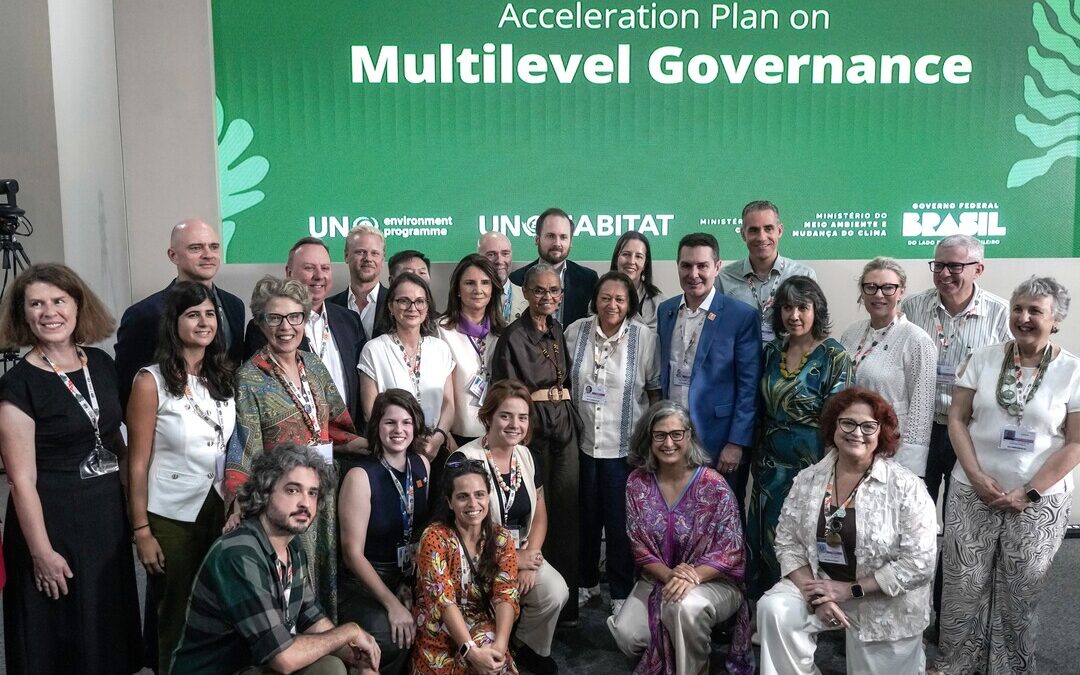DAY 2: Cities, Water and Local Leaders Drive Momentum on COP30
Local leaders advanced major adaptation, water and urban resilience measures at COP30 as cities accelerated climate action.
Local and subnational leaders pushed climate implementation forward on Tuesday as COP30 turned its focus to adaptation, cities, water, waste and technology. The day highlighted how action on the ground is shaping global climate delivery.
Cities moved into the spotlight as governments and partners advanced efforts to protect communities from rising heat. The Beat the Heat Implementation Drive shifted into delivery mode, bringing new finance and partnerships to shield 3.5 billion people in 185 cities.
During the High-Level Ministerial Meeting on Urbanization and Climate Change, governments launched the Plan to Accelerate Multilevel Governance. The initiative aims to embed multilevel structures into 100 national climate plans by 2028 and train 6,000 local officials.
Brazil and Germany agreed to co-chair the Coalition for High Ambition Multilevel Partnerships, or CHAMP coalition, through 2027 to align national ambition with local delivery.
Buildings Agenda Gains Strength
Ministers also met for the first session of the Intergovernmental Council for Buildings and Climate. They endorsed a call to action that urges governments to integrate climate measures into housing policy by 2030–2035. The plan links affordability with climate resilience and proposes an alliance to expand finance for sustainable housing.
Water Security Moves to Center Stage
Water resilience gained prominence as regional institutions unveiled a $20 billion investment program for Latin America and the Caribbean. The funding pipeline will support drinking water, irrigation upgrades and protection from floods and droughts.
Later, the High-Level Ministerial on Water and Climate Action produced a joint statement that reaffirmed water as a core pillar of adaptation. Brazil also introduced two acceleration plans focused on water governance and access for vulnerable communities.
Waste Management Takes Aim at Methane
A global effort to curb methane from organic waste was launched with the No Organic Waste plan. The program targets a 30 percent cut in methane emissions from waste by 2030. With a commitment of $30 million, it seeks to recover 20 million tonnes of surplus food each year, feed 50 million people and bring 1 million waste workers into the circular economy.
Action Agenda Spaces Open
COP30 opened its new Action Agenda Thematic Spaces, which will host events tied to the Global Stocktake framework. The launch honored outgoing COP29 High-Level Champion Nigar Arpadarai for her role in expanding inclusive climate action.
The Yearbook of Global Climate Action 2025 was also published, offering data on progress and gaps in global mitigation and resilience efforts.
Local Leadership Gains New Tools
Brazil announced new steps to strengthen multilevel climate governance. The Plan to Accelerate the Solution supports integration of local and national priorities, while Country Platforms for Localizing Finance will start work in Cameroon and Madagascar. The platforms aim to mobilize $350 million by 2028.
Heat Resilience Efforts Expand
The Beat the Heat plan continued to gain traction. The program promotes nature-based cooling, high-efficiency technology and passive building design. It supports heat action plans in schools, health centers and public spaces.
“Beat the Heat is an example of bringing everyone together with a specific goal of capacity-building through hope and actions,” COP30 President Ana Toni said.
Digital Access Broadens Participation
Maloca, a virtual platform developed with UNDP, offered new tools for public participation in COP30 events. The platform features immersive spaces that highlight climate resilience, Indigenous knowledge and innovations in digital inclusion.
Circular Economy Push Advances
Brazil’s communications ministry and the COP30 Presidency showcased progress on e-waste. The Mutirão for Sustainable E-Waste Management reported collecting 1,000 tonnes of waste and providing training to 2,700 youth. It also delivered 100 refurbished computers to community centers, linking recycling with access to technology.
Ground-Up Leadership Closes the Day
Ministers and mayors from more than 80 countries closed the day at the Global Mutirão Ministerial Plenary. They stressed that cities and communities are driving the next phase of the Paris Agreement and shaping a more resilient world from the ground up.
Also Read:
Day 1: COP30 Opens With Unified Call for Technology-Driven Adaptation
Nirmal Menon
Related posts

Subscribe
Error: Contact form not found.


